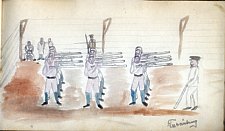
Sketch by Schmitz - Gymnastics
Up to the entry of the USA into the war in early 1917, the Americans looked after the interests of the German and Austro-Hungarian Governments - one of their duties was to inspect and report on the various internment camps - one such report is given here reformatted from the original typescript but otherwise unchanged. This report is extracted from a longer report by Mr Jackson reporting on visits to many places of internmen Original held at TNA in file FO 383/106
In regard to the two camps in the Isle of Man, at Knockaloe near Peel and at Douglas, a report has already been made by Mr. Charles Hale.
When I visited the Knockaloe-camp, on February 9, there were about 2000 interned persons in two separate compounds containing ten barracks each. Three additional compounds were in course of construction, which when completed would make the capacity of the camp 5000.
The camp is in a hollow, on clay soil in which the cinders used at first for roads had quickly disappeared, making it necessary to build plank roads. There is very little space within the enclosures for exercise and no work is provided for the prisoners, except in connection with the "police" of the camp, cooking, and repairing clothing, etc.
For exercise the men may make marches, under guard, in the country roads but during the winter most of them had preferred to spend their time in the barracks, reading and playing cards.
The barracks were divided longitudinally by a partition, bunks being arranged in tiers of three against this partition and in tiers of two against the sides of the building, a row of tables and benches filling the space between. At one end of each half building is a small room for its "captain", but otherwise all prisoners are treated alike. The buildings were heated by stoves and lighted by electricity.
In a separate building shower baths were provided and warm water was available for personal use and for washing clothes.
The cooking is done by Germans, and the food seemed generally satisfactory. Smoking is permitted. There were ample hospital accomodations, but the usual complaints of those who wished for special treatment.
There had been no deaths in the camps. There were no water closets, the pail system being used. The pails were said to be emptied twice a day, and this system seems to meet with approval by the British military authorities. At the time of my visit there were no unpleasant odors, but conditions might easily become dangerous in warm weather of if there were many flies.
The prisoners had been allowed to order sausages from London, but on the day of my visit considerable discontent had been caused by the fact that all sausages had been cut open because newspapers had been found concealed in them in a previous shipment. The cantine facilities appeared to be adequate and it was arranged that sausages should be ordered through it in the future and not sent to individuals. Moreover, as certain English newspapers are now permitted, the temptation to smuggle will be decreased. Cigars had also been cut open, because smuggled letters had been found in them
There had been a celebration on January 27, in regard to which inaccurate reports had appeared in an Isle of Man newspaper, The usual mail facilities were provided. In this as in most of the other camps there were sailors of all ages.

Sketch by Schmitz - Gymnastics
Isle of Man Examiner, Saturday, January 30, 1915; Page: 4
Stop it!
It is a matter of public notoriety that German and Austrian prisoners of war now interned at Knockaloe Detention Camp are suffered by the camp authorities to engage daily in military drill. The prisoners parade regularly, carrying dummy rifles and bayonets of their own ingenious construction, and are put through a course of martial exercise by one of their number, who has either constituted himself commandant or has been elected to the position. That the prisoners show marked aptitude for this drill is not the least disquieting feature of the situation. Why should these enemies of the couutry be allowed to thus fit themselves to fight against us in the event of their release or exchange? That the men should be encouraged to keep themselves in good bodily condition by wholesome games is in their interest and our own, but that they should be privileged to train themselves for war is nothing short of a public scandal. As Sam Weller once pertinently inquired, "Ain't anybody to be whopped for this?" It is said, though we cannot vouch for the truth of the statement, that on Kaiser Wilhelm's birthday — last Wednesday — the prisoners held a sort of peacock parade by way of celebrating the occasion, and goose-stepped triumphantly about the camp. If such a proceeding was permitted it amounted to an indecent aggravation of the supineness of the authorities in their passive encouragement of drill. By all means let the prisoners be treated fairly, but such ill-advised and improper leniency is a reproach to the persons in control of the camp.
This report obviously reached London as a question was raised in Westminster
|
|
||
|
|
||
| Any comments, errors
or omissions gratefully received The
Editor HTML Transcription © F.Coakley , 2021 |
||